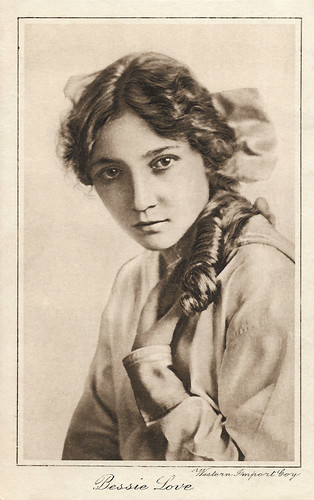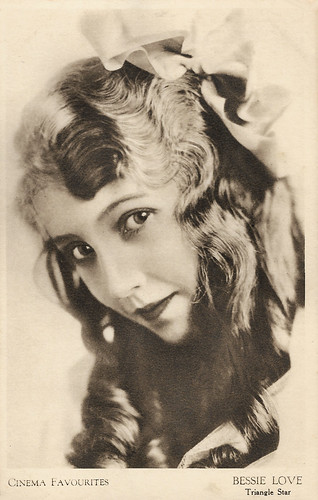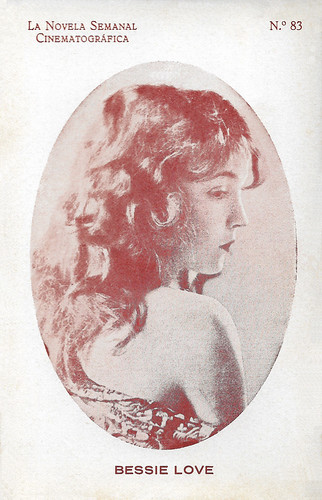
French postcard by Editions Cinémagazine, no. 163.

Vintage postcard by Engret R.C. & A.H., no. 246. Photo: Vitagraph. Collection: Marlene Pilaete.

British postcard by Cinema. Photo: Western Import Co.

British postcard in the Cinema Favourites series by Photochrom Co., London, Ref. 102. Photo: Triangle.

Spanish postcard by La Novela Semanal Cinematografica, no. 83.
The first screen Charleston dance
Bessie Love was born Juanita Horton in 1898 in Midland, Texas. Her cowboy father moved the family to Arizona, New Mexico, and then to Hollywood, where he became a chiropractor.
As the family needed money, Bessie's mother sent her to Biograph Studios, hoping she would become an actress. Pioneering film director D.W. Griffith saw she was pretty and had some acting talent. He put her in several of his films, including a small part in Intolerance: Love's Struggle Throughout the Ages (D.W. Griffith, 1916).
Love dropped out of Los Angeles High School to pursue her film career, although she completed her diploma many years later. Her first important role was in the drama The Flying Torpedo (John B. O'Brien, Christy Cabanne, 1916), starring John Emerson.
Bessie became popular with audiences and worked with Douglas Fairbanks in Reggie Mixes In (Christy Cabanne, 1916) and The Mystery of the Leaping Fish (John Emerson, Christy Cabanne, 1916). William S. Hart was her co-star in The Aryan (Reginald Barker, William S. Hart, Clifford Smith, 1916).
She then moved to Vitagraph and starred in a number of comedy-dramas. She took an active role in the management of her career, upgrading her representation to Gerald C. Duffy, the former editor of Picture-Play Magazine, and publicising herself by playing the ukulele and dancing for members of the military.
In 1922, Love was chosen as a WAMPAS Baby Star. In the 1920s she began to act in more mature roles. In 1923, she starred in Human Wreckage (John Griffith Wray, 1923), with Dorothy Davenport and produced by Thomas Ince. The next year, she starred in Those Who Dance (Lambert Hillyer, 1924), opposite Blanche Sweet. She also began to work on the stage.
She performed the first screen Charleston dance in The King on Main Street (Monta Bell, 1925) starring Adolphe Menjou. Her technique was documented in instructional guides, including a series of photographs by Edward Steichen. She subsequently performed the dance the following year in The Song and Dance Man (Herbert Brenon, 1926).
She also starred in The Lost World (Harry O. Hoyt, 1925), a Science-Fiction adventure based on the novel of the same name by Sir Arthur Conan Doyle. Love gave one of her best performances in Dress Parade (Donald Crisp, 1927) with William Boyd. The following year, she starred in The Matinee Idol (1928), a romantic comedy directed by a young Frank Capra. In 1929, she married agent William B. Hawks. They would have one child, Patricia (1932), and divorced in 1936. It would be her only marriage.

American 'Arcade' postcard. Photo: First National .Bessie Love in The Silent Watcher (Frank Lloyd, 1924).

French postcard by Cinémagazine-Edition, Paris, no. 482.

French postcard by Cinémagazine-Edition, Paris, no. 660. Photo: Metro-Goldwyn-Mayer. Bessie Love in The Broadway Melody (Harry Beaumont, 1929).

French postcard by Europe, no. 675. Photo: Metro-Goldwyn-Mayer.

British postcard in the Celebrity Series by The Ram Challenges Company / Associated Photo Printers, London., no. 132. Photo: Metro-Goldwyn-Mayer.

British 'Real Photograph' postcard in the Autograph Series, London, no. A 36.

British Real Photograph postcard by Sarony, no. 62. Photo: Metro Goldwyn Mayer. Caption: No. 62 of a second Series of 42 CINEMA STARS issued with Sarony Cigarettes.
A 5-year contract with MGM
Bessie Love toured with a musical revue for sixteen weeks. The experience she gained on the Vaudeville stage singing and dancing in three performances a day prepared her for the introduction of sound films.
When sound came into vogue, Bessie Love made a number of them and received an Academy Award nomination for The Broadway Melody (Harry Beaumont, 1929). The success of the film resulted in a 5-year contract with MGM and an increase in her weekly salary.
By 1931, however, her Hollywood career was over. She moved to England in 1935 and did stage work and occasional films there. Love briefly returned to the United States in 1936 to seek a divorce.
During World War II, she entertained the troops and also worked for the Red Cross. By the 1950s she started playing small roles in films such as No Highway (Henry Koster, 1951), starring James Stewart and Marlene Dietrich, and The Barefoot Contessa (Joseph L. Mankiewicz, 1954) with Humphrey Bogart and Ava Gardner.
In England, Love had a substantial supporting part and received fifth billing in Ealing Studios' Nowhere to Go (Seth Holt, 1958) with George Nader and Maggie Smith in her film debut. She also played small roles in The Greengage Summer (Lewis Gilbert, 1961) starring Kenneth More, the James Bond thriller On Her Majesty's Secret Service (Peter R. Hunt, 1969) with George Lazenby and Diana Rigg, and in John Schlesinger's Sunday Bloody Sunday (1971). She also played the mother of Vanessa Redgrave's titular character in Isadora (Karel Reisz, 1968).
In the 1980s she appeared in the big-budget Ragtime (Milos Forman, 1981) which starred James Cagney, and later that year in Reds (Warren Beatty, 1981) which starred Warren Beatty and Diane Keaton. Her final film was the erotic horror film The Hunger (Tony Scott, 1983), starring Catherine Deneuve and David Bowie.
Bessie Love passed away in 1986 in London, England, UK.

Belgian postcard by S.A. Cacao et Chocolat Kivou, Vilvo[o]rde, Belgium.

German postcard by Ross Verlag, no. 4516/1, 1929-1930. Photo: Metro-Goldwyn-Mayer.

German postcard by Ross Verlag, no. 5095/1, 1930-1931. Photo: Metro Goldwyn Mayer.

German postcard by Ross Verlag, no. 5368/1, 1930-1931. Photo: Metro Goldwyn Mayer.

French postcard by Edition Ross, no. 5619/1, 1930-1931. Photo: Metro-Goldwyn-Mayer.

Austrian postcard by Iris Verlag, no. 6046. Photo: Metro Goldwyn Mayer. Sent by mail in 1931.
Sources: Tony Fontana (IMDb), Wikipedia, and IMDb.
No comments:
Post a Comment